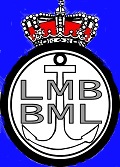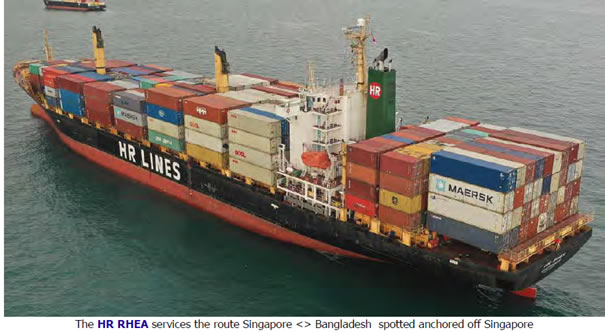

DOSSIER
- Welcome
Accueil - Nieuws
Nouvelles- 22/12 End of an Era: Historic SS United States Transferred to New Owners
- 24/12 SS United States Title Transferred, Work Starts to Move Ship
- 26/12 MARITIEM MUSEUM
- 28/12 UK to check ‘shadow fleet’ tankers for ‘suspect, dubious’ insurance during English Channel transits
- 31/12 Transpetro to use Marlink’s VSAT + Starlink hybrid solution on 26 tankers
- 01/01 U.S. Sanctions Fail to Stop Chinese Power Plant, Delivery Salvages Next Stage of Russian Arctic LNG Plant
- 03/01 India’s Oil Demand Drives CMB Tech Fleet Diversification
- 07/01 World’s Oldest Shipwreck Is at Dokos Island, Greece
- 09/01 Port Oostende Fights to Preserve Critical RoRo Shipping Route.
- 11/01 LNG bunkering poised for a bright future
- 14/01 Russische driemaster Shtandart nergens welkom, kapitein wacht met smart op coulance van Brussel
- 16/01 Russia resells more gas in Europe after cutting off Austria, sources, data show
- Kalender Calendrier
- BML Nieuws
LMB Nouvelles - Historiek
Historique- 18/11 De schipbreuk van de kotter Princess of Wales en de schoener l'Aventure (I)
- 25/11 De schipbreuk van de kotter Princess of Wales en de schoener l'Aventure (II)
- 08/12 Een beetje geschiedenis (I)
- 15/12 Een beetje geschiedenis (II)
- 21/12 Een beetje geschiedenis (III)
- 29/12 De schipbreuk van de kotter Princess of Wales en de schoener l'Aventure (III)
- 05/01 De schipbreuk van de kotter Princess of Wales en de schoener l'Aventure (IV)
- 12/01 De schipbreuk van de kotter Princess of Wales en de schoener l'Aventure (V)
- 19/01 De schipbreuk van de kotter Princess of Wales en de schoener l'Aventure (VI)
- Dossier
Dossier
- 20/12 Corrupt port officials: what we all do to get by
- 23/12 Decarbonisation’s negative impact on seafarer workload and stress
- 25/12 Methane emissions measurement standards needed as penalties loom
- 27/12 Dirty-to-clean switch caps high LR2 tanker freight rates as supply widens
- 30/12 How SECNAV’s claims about S. Korean, Japanese shipbuilders do and do not line up
- 02/01 Why do ships ‘zig’ when they should have ‘zagged’?
- 04/01 Namibia to rival Guyana as world’s newest oil and gas hotspot following massive offshore discoveries
- 06/01 Zenobe Gramme
- 08/01 How SECNAV’s claims about S. Korean, Japanese shipbuilders do and do not line up
- 10/01 Ocean container shipping market reaches a tipping point
- 13/01 La révolution culturelle chez Maersk, les revirements et autres effets de panique
- 15/01 Sharing tussles over major sea route worry exporters
- 17/01 Somali piracy: It's more sophisticated than you thought
- 20/01 Containership and port operators face a host of issues as peak season arrives
- Raad
Comité - Verenigingen
Associations - Contacten
Contacts - Links
Liens - Boeken
Livres - Archives
Archieven- Archieven 1 - Archives 1
- Archieven 2 - Archives 2
- Archieven 3 - Archives 3
- Archieven 4 - Archives 4
- Archieven 5 - Archives 5
- Archieven 6 - Archives 6
- Archieven 7 - Archives 7
- Archieven 8 - Archives 8
- Archieven 9 - Archives 9
- Archieven 10 - Archives 10
- Archieven 11 - Archives 11
- Archieven 12 - Archives 12
- Archieven 13 - Archives 13
- Archieven 14 - Archives 14
- Archieven 15 - Archives 15
- Archieven 16 - Archives 16
- Archieven 17 - Archives 17
- Archives 18 - Archieven 18
- Archieven 19 - Archives 19
- Photos
Foto's
Sharing tussles over major sea route worry exporters
BY : JASIM UDDIN HAROON
Some foreign shippers desert Colombo-West transshipment route following rules tightening
A veritable tug-of-war ambiance over seizing market share in Bangladesh's one of the biggest sea routes stokes up concerns among the users, especially clothing exporters, about cost and time escalations.This route carries importance for the shipment from Bangladesh as it facilities four-day lead time for the clothing exporters, in particular.
The fights between Bangladesh-flaged vessels and foreign ships began soon after the issuance of a rule under the Bangladesh Flag Vessels Act 2019 sometime in 2023 by the government of Bangladesh, sources in the shipping circles said.
The Chattogram-Colombo route leading to major markets handles more than 40 per cent of goods belonging to Bangladesh. The country's total external trade is believed to be worth US$120 billion. The major international shipping route connects Bangladesh with its trading partners across the globe. After reaching Colombo, Sri Lanka, the cargos are loaded onto big vessels bound for different destinations in America and Europe. When the government's implementing agency concerned, named MMD, enforced the rule tightly through showcases and penalties on foreign vessels, many foreign vessels withdrew from the route.The rule provides for waiver certificate from the MMD for transporting goods belonging to Bangladesh. The certificate should have been taken 15 days earlier despite the fact that the one-side voyage needs to be completed in 3-4 days.Before such execution of the rule called flat protection or protection of interests, there were more than 20 vessels, mostly foreign feeder vessels, plying the transshipment route.
Now it is trimmed to around 12 vessels, mostly Bangladesh-flagged vessels.
One of world's shipping giants -- CMA-CGM of France -- Tokyo-based ONE, Doha-based MALIHA and Dubai-based Unifeeder left the route. Many shipping executives blame the tussle between the local and foreign shipping companies for the situation. The Flag Protection Act was enacted with the aim of transporting 50 per cent of the country's merchandise on domestic vessels, including the state-owned Bangladesh Shipping Corporation (BSC) ships. "But the BSC does not have any single-container ship and, as such, it is impossible to transport 50 per cent of goods by domestic ships," says one of the trade sources.

One local flag-vessel company, HR Line, now dominates the cargo-haulage route. Contrarily, one leading foreign line, X-press Line of Singapore, is struggling to survive on the route despite the fact that the relevant UN body is in favour of maintaining a level playing field for all. As per the UNCTAD, 40 per cent can be protected for the local vessels, 40 per cent belong to the trading-partner vessels and the remaining 20 per cent to be kept open for grabs. As the foreign vessels are leaving the route, port-users apprehend "monopoly" from local shipping companies on the vital part of the country's foreign-trade processing. Garment manufacturers that employ more than 5.0 million people, mostly women, in the jobs-scant economy, raised their voice few times against the execution of the rule, arguing this will impact their shipments.
Syed Nazrul Islam, a first vice president of BGMEA, the apex body of garment producers, told the FE that they had expressed their concern many times on the issue as they believe their goods delivery may be affected once there be shortage of vessels meant for the Ctg-Colombo route. "We produce clothing for different seasons, and once there are delays in reaching the goods, the buyers will not pay as we had contracted them. "Mr. Islam notes that once they fail due to poor number of vessels on the route, delivery of goods will be impacted and buyers will not give them orders for the next season. He mentions that this route is very much important for them as they enjoy 4-day lead time. One senior official at HR Line, when met its Dhaka office, told the FE correspondent that they are still having a much lower share than they should have enjoyed under the rule. "Actually we don't get any special privilege," he said. Asked about the penalties imposed on the foreign ships, he said that the penalties should have been much more. The shipper, however, informed that Unifeeder was their own agency and they requested them to withdrew as there is no good business for the line there. The World Shipping Council issued another letter urging the government to amend some sections of the rule, on a note of concern over the fist-tightening. The Singapore office of the Washington-based navigation organisation called for relaxation of several terms and conditions laid down in the law. It referred to the provision of obtaining waiver certificate in 15 days prior schedule. President of BCSA or Bangladesh Container Shipping Association Mr. Fayaz told the FE that many internationally reputed shipping companies left the route. He said local HRL has only 8.0-9.0-percent share. "In future any big shipping company will not come. "Captain Sabbir Mahmood, principal officer of the MMD, could not be contacted after reaped attempts for his comment on what looks like a tug-of-war ambiance over the seafaring.
LMB-BML 2007 Webmaster & designer: Cmdt. André Jehaes - email andre.jehaes@lmb-bml.be